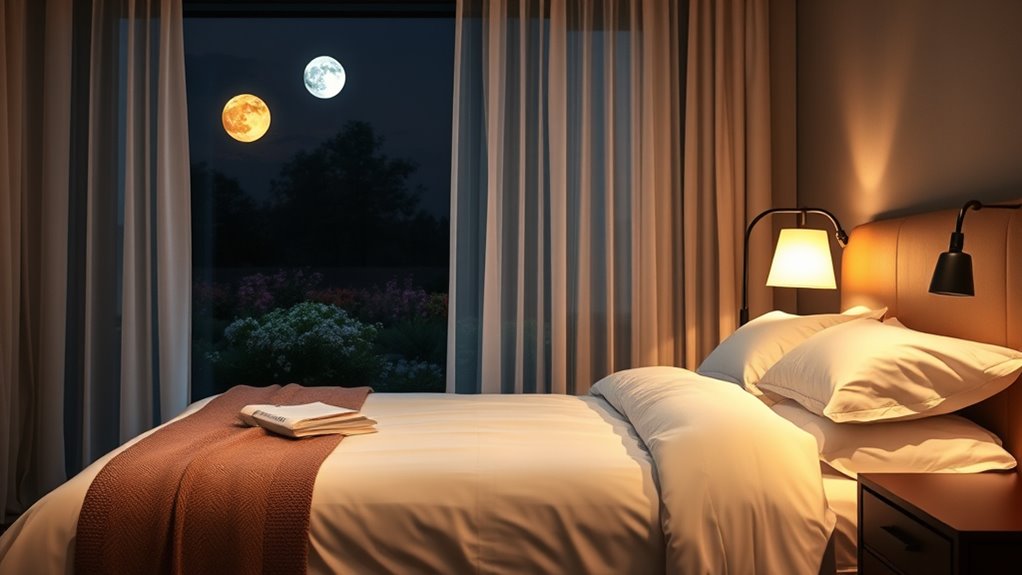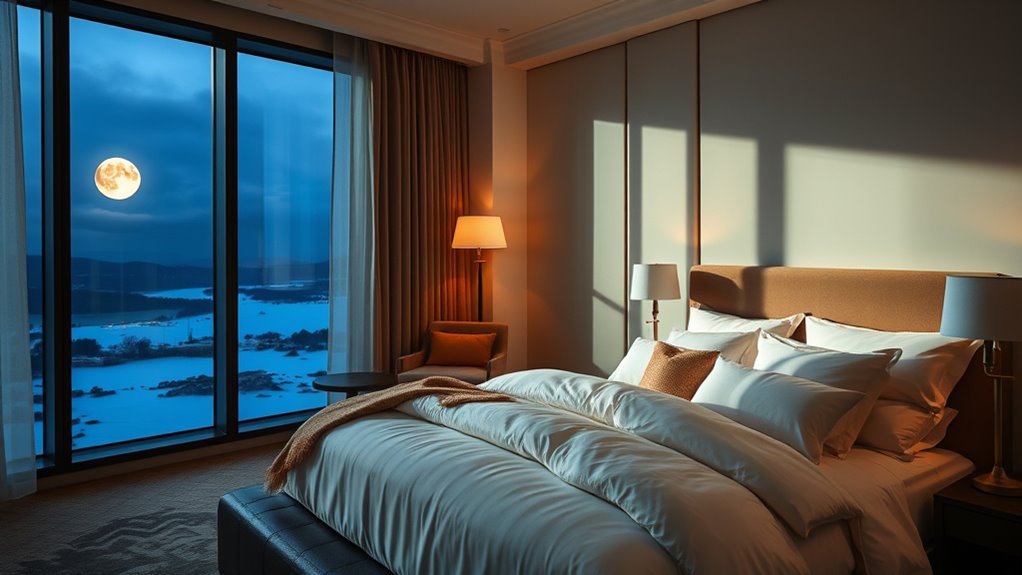Sleep tourism offers a promising way to address insomnia by creating environments that promote better rest and healthier sleep habits. Hotels focus on ideal sleep hygiene, using features like blackout curtains, soundproofing, and personalized guidance from experts. They may incorporate relaxation techniques and sleep-tracking technology to help you improve your sleep patterns. While a hotel stay can kickstart better sleep routines, exploring how these innovations work can reveal more ways to break free from insomnia.
Key Takeaways
- Specialized sleep-focused hotels offer environments and programs designed to improve sleep habits and address underlying sleep issues.
- Incorporating sleep hygiene practices and relaxation techniques can help reduce insomnia symptoms during and after the stay.
- Technology like sleep tracking and expert guidance allows personalized adjustments to enhance sleep quality.
- Sleep therapy options, including CBT-I and consultations with specialists, can target specific insomnia causes.
- While not a cure, sleep tourism can promote healthier routines and provide long-term benefits for better sleep at home.

Sleep tourism is quickly gaining popularity as travelers seek unique ways to improve their rest and overall well-being. You might be surprised to learn that a hotel stay could be more than just a relaxing getaway—it might actually help address your sleep issues. Many sleep-focused accommodations now emphasize the importance of good sleep hygiene, which is essential for overcoming insomnia and other sleep disturbances. Sleep hygiene involves simple habits like maintaining a consistent sleep schedule, creating a restful environment, and avoiding caffeine or screens before bed. When you stay at a sleep-centric hotel, you’re encouraged to adopt these habits, often with the guidance of trained staff who understand the nuances of good sleep practices. This environment helps you reset your sleep patterns and develop healthier routines that you can carry home.
Sleep-focused hotels promote good sleep habits and environment to help reset your sleep patterns and improve overall rest.
In addition to promoting sleep hygiene, these hotels often incorporate specialized sleep disorder therapies into their programs. Whether you’re dealing with chronic insomnia, sleep apnea, or restless leg syndrome, you can find treatments tailored to your needs. Some hotels partner with sleep clinics or specialists who provide screenings, consultations, and personalized therapies. These might include cognitive behavioral therapy for insomnia (CBT-I), which is proven to be effective in changing negative sleep thoughts, or relaxation techniques like meditation and breathing exercises. The goal is to create an environment that minimizes disturbances and maximizes restorative sleep, leveraging both physical room setups—such as blackout curtains and soundproofing—and therapeutic interventions. Incorporating sleep tracking technology can help monitor progress and fine-tune your sleep routines for better results.
What sets sleep tourism apart is that it offers an immersive experience. You’re not just staying in a hotel; you’re entering a space designed to prioritize your sleep health. Many of these establishments incorporate cutting-edge technology, like sleep trackers and light therapy, to optimize your rest. You might also receive personalized advice from sleep experts, who analyze your sleep patterns and recommend adjustments you can implement long-term. This holistic approach helps you understand your sleep challenges and learn practical solutions that go beyond just catching up on rest during your stay.
Ultimately, sleep tourism enables you to break free from the cycle of poor sleep. By focusing on sleep hygiene and exploring effective sleep disorder therapies in a supportive setting, you stand a better chance of resolving your sleep issues. It’s an innovative way to invest in your well-being, turning a simple hotel stay into a potential turning point for healthier, more restful nights at home.
Frequently Asked Questions
Are Sleep Tourism Packages Suitable for Severe Insomnia?
Severe insomnia requires careful consideration before trying sleep tourism packages. While alternative treatments like therapy or medication might be more effective, staying at a hotel in a relaxing location could help reduce stress and promote better sleep. However, the success depends on your specific needs and the hotel’s environment. It’s best to consult a healthcare professional first to determine if a sleep tourism experience complements your treatment plan.
How Much Does a Sleep Tourism Stay Typically Cost?
A sleep tourism stay usually costs between $200 and $1,000 per night, depending on the hotel and package. You’ll find luxury accommodations offering relaxation packages designed to improve sleep quality. These stays often include specialized beds, calming environments, and wellness treatments. Keep in mind that prices vary widely, so it’s best to research options that match your budget and needs for a restful, rejuvenating experience.
What Amenities Are Usually Included in Sleep-Focused Hotel Stays?
In sleep-focused hotel stays, you usually get amenities designed to improve rest, like luxury bedding and blackout curtains that create a peaceful environment. Many hotels also offer sleep-focused menus with calming foods and herbal teas to promote relaxation before bed. Some places provide sleep aids such as white noise machines or adjustable lighting, ensuring you’re comfortable and ready to rest, making your stay truly restorative.
Can Sleep Tourism Help With Underlying Sleep Disorders?
Ever wonder if sleep tourism can truly help with underlying sleep disorders? While it offers a tailored sleep environment and relaxation techniques that promote restful sleep, it’s not a cure-all. You might find temporary relief, but addressing root causes requires medical guidance. Think of sleep tourism as a soothing chapter in your sleep story—enhancing your overall rest, but not replacing professional treatment for persistent issues.
How Long Should a Stay Be to See Benefits?
You might wonder how long you should stay to see benefits. The ideal stay varies, but generally, a week or more of improved sleep environment can help reset your sleep duration and habits. During this time, you give your body a chance to adjust, potentially reducing insomnia symptoms. Listen to your body, and if you notice improvements, extending your stay or maintaining good sleep practices can maximize results.
Conclusion
Imagine slipping into a hotel bed as if entering a gentle dream, where each night’s rest transforms your restless nights into peaceful dawns. Sleep tourism isn’t just about a stay; it’s a journey back to yourself, a lighthouse guiding you through the storm of insomnia. Sometimes, all you need is a change of scenery to find your way home—back to restful nights and mornings filled with hope. Your path to healing begins with a simple, restful voyage.









